Food and Agriculture Session Highlights Inclusive Business Models for Systems Transformation at P4G Summit
.png)
Subject
P4G Summit
Country
Denmark, Ethiopia, South Africa, The Republic of Korea, Netherlands, United Mexican States (Mexico)
Publication Date
2021-06-02
About
At the 2021 P4G Seoul Summit Thematic Session on “Resilient and Sustainable Agriculture and Food Systems,” P4G network champions advanced strategies to strengthen food security through sustainable agriculture and reduce food loss and waste by accelerating innovative financial models. Moderated by Claire Kneller, Head of International Food Programme at Waste and Resources Action Programme (WRAP), the session highlighted the importance of scaling inclusive market-based solutions to transform food systems in developing countries.
Byeong-Am Choi, Minister of the Korea Forest Service delivered keynote remarks about the need to balance a sustainable and resilient agri-food system. Minister Choi highlighted the P4G Agroforestry for People, Peace and Prosperity partnership, which enables Ethiopian coffee farmers to restore degraded lands and export fair-trade products for the gourmet coffee market in Korea. The partnership hopes to replicate the business model to other major coffee producers in P4G’s ecosystem.
Bas Rüter, Director of Sustainability at Rabobank framed food loss and waste as an investment opportunity, sharing Rabobank’s approach through an SDG 12.3 loan, which provides a financial solution that rewards positive accomplishments and sanctions based on performance. Rüter noted that Rabobank would be joining the P4G FLAWLESS partnership, as they work together to set ambitious measurable targets and accelerate action on the ground. “By doing so, we hope to be able to actually speed up the development into food loss and waste reduction by creating market incentives to do the right thing,” Rüter said.
Providing insights on FLAWLESS’ implementation in South Africa, Bruno Olierhoek, Managing Director and Chairman for the East and Southern African Region at Nestle, underscored how reducing food loss and waste is a necessary stalwart against food insecurity in the country. Sharing the FLAWLESS model of voluntary agreements for corporations to measurably reduce food loss and waste, Olierhoek noted how support from the highest levels in South Africa’s government inspired the private sector to come on board, and now smaller, local independent players are also signing up, making the approach more holistic across the entire value chain. With support from platforms like P4G, Olierhoek highlighted the importance of mobilizing financial systems for a circular approach.
Daan Wensing, CEO of IDH – the Sustainable Trade Initiative, shared how IDH through the SourceUp online platform, links buyers and smallholder farmers. As part of P4G’s Sustainable Sourcing at Scale Partnership in India, the platform has the potential to scale in P4G partner countries, linking markets across the world and collectively creating financial incentives to the benefit of nature, people, and the economy.
Charlotte Sorensen, Senior Project Manager, Arla Foods Ingredients, introduced the P4G Sustainable Food Partnership, which uses protein from local crops to produce a more nutritious biscuit for Ethiopia. Sorensen noted the importance of approaching this project through reverse engineering, where the partnership started by identifying consumer needs and the price they’d be willing to pay before working together with local producers to develop these products. The partnership is redefining the nutrition biscuits consumed by school children and refugees, with the hope to scale in similar markets experiencing malnutrition and food insecurity.
Closing the session, Fekadu Beyene, Commissioner of Ethiopia’s Forest and Climate Change Commission, remarked on the innovative and inspiring business models presented that are aimed at building resilience. He noted the important takeaway that market-based solutions are a silver bullet to deliver climate action at speed and scale. “P4G's unique position of bringing on board private sector stakeholders and hands-on experience and engagement of leading global networks will bolster the transformative impacts,” said Beyene.
Watch the full session recording here.
P4G Summit Session on Circular Economy Accelerates Innovative Solutions for Green Growth
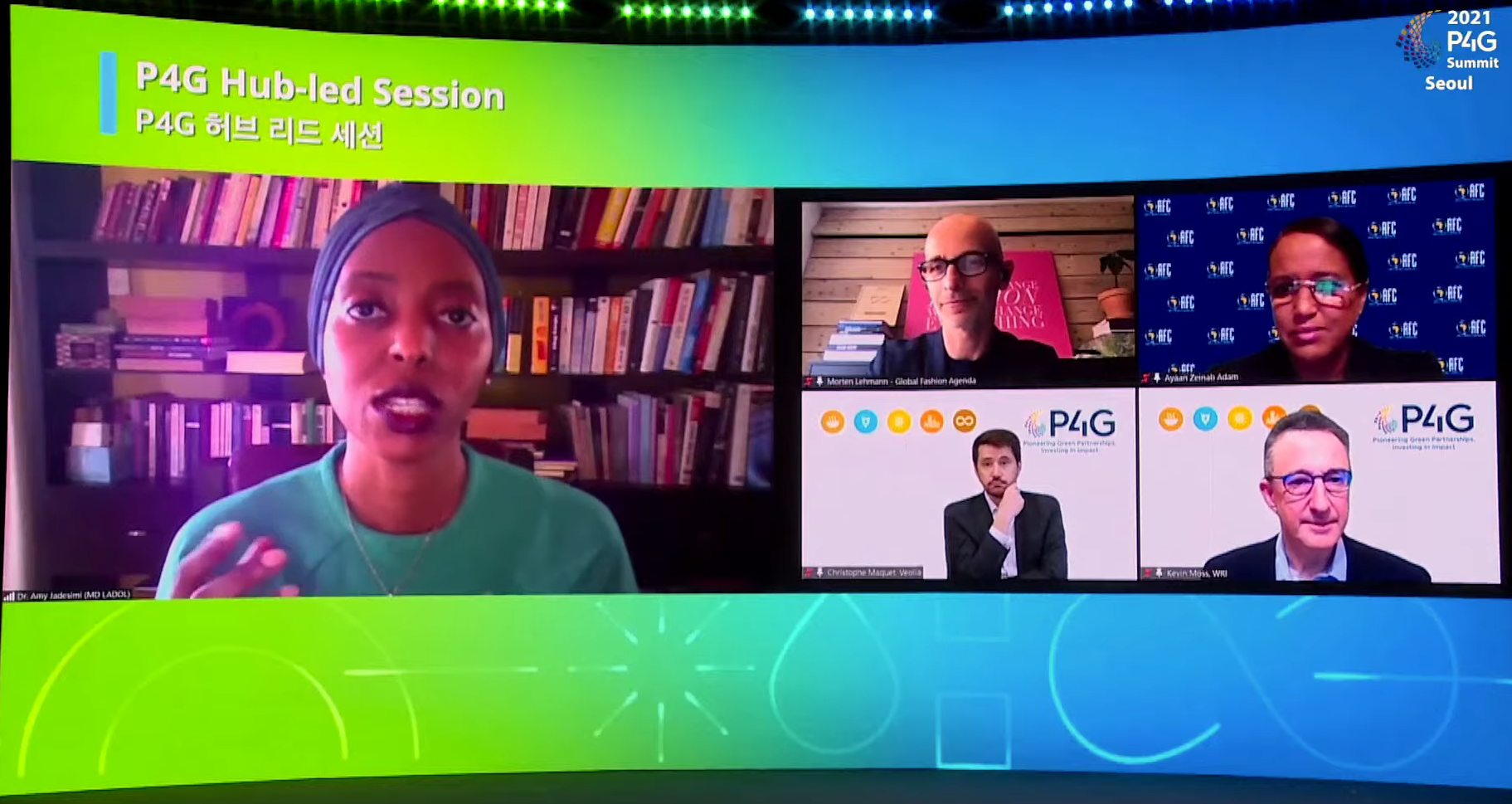
Subject
P4G Summit
Country
Bangladesh, Denmark, Indonesia, Kenya, The Republic of Korea
Publication Date
2021-06-01
About
The 2021 P4G Seoul Summit Thematic Session on “Circular Economy Measures towards a Zero Waste Society” featured an engaging discussion with key P4G champions advocating for innovative solutions to generate green growth. Moderated by Kevin Moss, Global Director, Center for Sustainable Business, World Resources Institute, this session emphasized the need to optimize the use of all resources and materials for a just, circular transition.
Kicking off the keynote remarks, Faruque Hassan, President, Bangladesh Garment Manufacturers and Exporters Association highlighted the link between the need to build back better for a garment industry hit hard by COVID-19 and the opportunity to shift the fashion business model to a circular one. With Bangladesh’s prominent role in textile production, Hassan urged stakeholders to strengthen the local ecosystem for circularity, as Bangladesh’s garment industry seeks to close the loop for a just transition.
Dr. Julius Muia, Principal Secretary, National Treasury and Planning, Kenya, emphasized Kenya’s priorities of green manufacturing where the government has collaborated with P4G to accelerate sustainable industrial clusters, making them feasible and profitable. Dr. Muia remarked that P4G has provided a proven roadmap model of implementation through sustainable clusters that will help Kenya achieve its climate ambitions while driving forward economic growth.
Suharso Monoarfa, Minister of National Development and Planning, Indonesia, outlined his country’s commitment to circular economy as essential to meeting the sustainable development goals. Through Indonesia’s Vision 2045 and Green National Development plan, Indonesia has defined low-carbon and climate resilient development as a national priority while integrating circular economy strategy throughout the plans. “We are optimistic that with collaboration of all stakeholders, economic transformation through low-carbon development and circular economy can be a long-term solution for Indonesia,” Minister Monoarfa said.
In the panel discussion, key changemakers shared their lessons learned from implementing circular economy business models, as well as what P4G can do to further scale their agendas. Amy Jadesimi, CEO, Lagos Deep Offshore Logistics Base, introduced her work with the P4G Partnership, SSEZ/Sustainable Industrial Clusters, which transformed LADOL Free Zone from a disused area into a fully integrated logistics space. “The industrialization of Africa using the blueprint that’s been created by LADOL in partnership with P4G that creates special economic zones that are industrial and sustainable is possible, it is profitable, and it is the preferable way to industrialize across the entire continent,” remarked Jadesimi.
Building on Faruque Hassan’s keynote remarks about Bangladesh’s sustainable fashion transition, Morten Lehmann, Chief Sustainability Officer, Global Fashion Agenda, framed the business opportunity to turn waste turned into a new valuable resource and attract investment for commercial sustainability. Through partnerships such as P4G’s Circular Fashion Partnership, Lehmann noted the value of engaging all stakeholders to ensure equity and inclusion.
Highlighting the role of plastics in the circular economy, Christophe Maquet, Senior Executive Vice President, Veolia Asia, presented the 3RI Partnership with P4G as a pioneering initiative that creates a market-based mechanism through plastic credit financing. This method urges the private sector to take action to reduce total plastic use throughout the value chain in a transparent and socially inclusive way.
Ayaan Zeinab Adam, Senior Director, Africa Finance Corporation, emphasized the need for local infrastructure development in Africa, especially in power, transport and logistics. Adam highlighted the need to work with platforms like P4G to mobilize institutional capital to translate development efforts into real projects that are financeable and bankable. This will enable African companies to build resilient infrastructure that is affordable, can attract capital, and offset climate costs.
The diverse group of panelists working on sustainable industrialization, circular fashion, and plastics recycling all emphasized the value of P4G in bringing together international cooperation for local implementation.
Stephan Sicars, Managing Director, Directorate of Environment and Energy, UN Industrial Development Organization closed the session by reiterating the business case for circular economy solutions, whereby stakeholders must adopt a whole of society and inclusive approach, facilitate partnerships, and ensure policy coordination. He summed up the discussion by validating the importance of innovative zero waste partnerships in testing and implementing viable circular economy models that could deliver a just transition.
Watch the full session recording here.
P4G Signs MOU with Korea Institute for Advancement of Technology
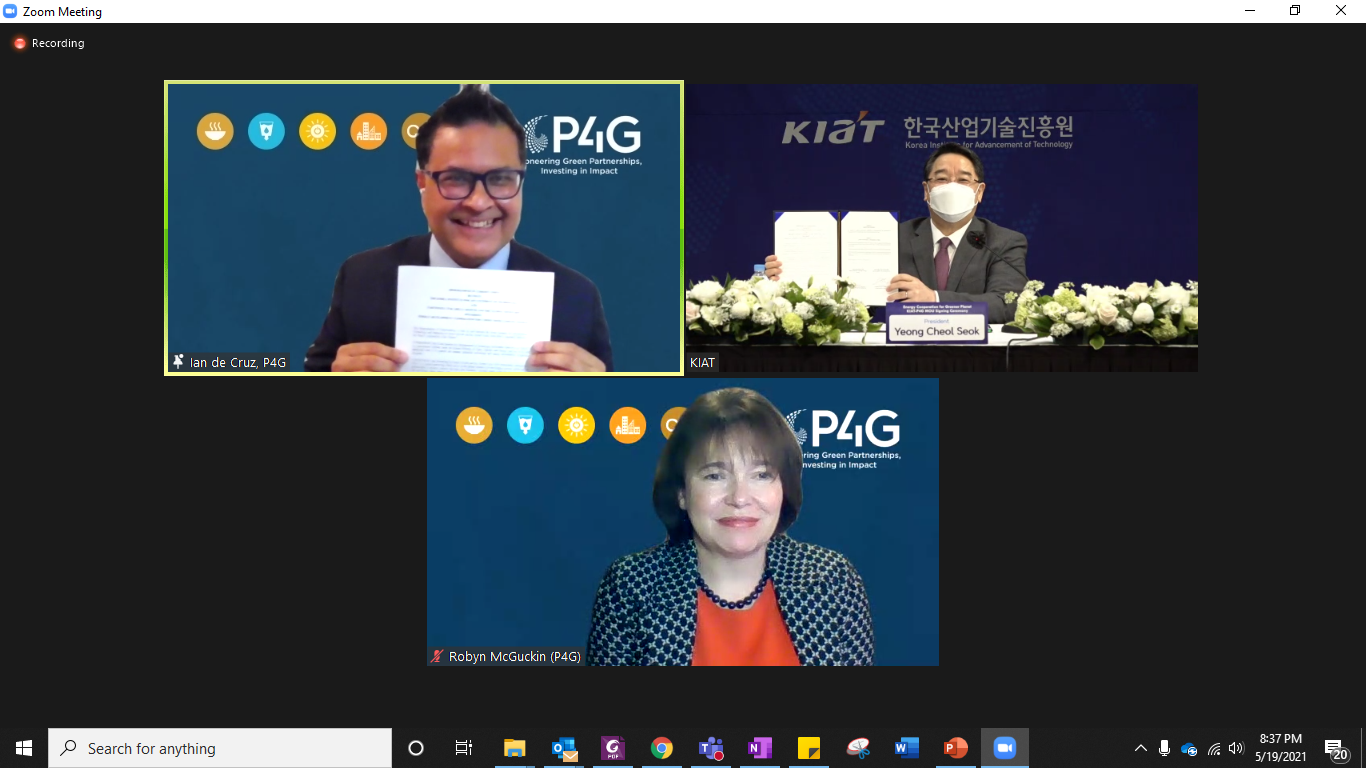
About
On May 19, P4G signed a Memorandum of Understanding with the Korea Institute for Advancement of Technology (KIAT) to develop renewable energy solutions to achieve net zero. The partnership will focus on accelerating market-based solutions that can progress an energy transition in developing countries.
The initial work will concentrate on identifying and developing solutions in microgrids, energy storage systems, electric mobility sharing stations and offshore wind projects in P4G partner countries such as Colombia, Ethiopia, Indonesia and Vietnam.
President of KIAT Yeong Cheol Seok kicked off the signing ceremony by sharing KIAT’s current efforts that have expanded to support renewable energy projects across 26 countries. He noted how Korea, through its Green New Deal, will increase its Official Development Assistance (ODA) projects to shares its technology with developing countries. He hoped this partnership with P4G that combines the best of both platforms – KIAT’s expertise in building the infrastructure for change and P4G’s expertise on developing the commercial viability of a model – will serve as an example for international cooperation.
P4G Global Director Ian de Cruz followed by remarking that the partnership serves as a necessary first step to provide market-based solutions in developing countries and mobilizing investments to scale and replicate them. He offered access to P4G’s partnership pipeline and highlighted the platform’s engaged global network as facilitating opportunities for KIAT to collaborate with countries like Denmark, Chile and the Netherlands to decarbonize energy systems. He urged a similar level of engagement from KIAT with a request for them to bring “the best of your solutions, pipeline of partnerships, investment and coalitions” to P4G.
Event speakers such as Director General of KIAT Seong Ryong Kang presented practical examples of some of the projects KIAT has scaled including a microgrid in Ethiopia that provided energy access to 484 households and a regulation system in Senegal to address the instability caused by renewable energy sources. P4G Director of Partnerships
Robyn McGuckin shared P4G’s strong impact model that translates high-level political commitment into private sector investment. Calling P4G a “doer on the ground” she spoke about P4G’s intensive co-creation process and partnership journey focused on delivering impact on the ground to change people’s lives. She also highlighted the importance of P4G partnerships aligning with a country’s economic and climate agenda, so all solutions are developed and accelerated on the country’s terms.
From co-creating a partnership, demonstrating its business case and investing to scale and replicate it, Director of KIAT Jae Min Lee laid out how the collaboration would work. He shared the exciting possibilities presented by P4G countries to deliver change. These include the solar and wind energy prospects (2,200 MW) of Colombia; the renewable energy generation potential of Indonesia (424 GW); and the offshore wind power potential of Vietnam (513 GW).
As de Cruz put it, “It is through this strategic partnership that we can achieve a net zero future for all.”
P4G Emphasizes Scaling Innovative Models for E-mobility at Nordic Sustainability Week in Mexico
.png)
Subject
Events
Country
Publication Date
2021-05-20
About
On May 18, P4G’s Director of Investments Sarbinder Singh joined the Nordic Sustainability Week in Mexico for an engaging discussion on e-mobility. The panel focused on how to overcome obstacles and bring together stakeholders to rapidly scale innovation and technological development for a zero-emissions transport transition. Singh shared P4G’s approach of bridging the gap between development and investment by accelerating emerging innovative models. “We need catalytic investment to make this transition smoother, more investable, and more sustainable,” said Singh.
Panelists like Rodrigo Díaz González, Undersecretary of Planning, Policies and Regulation in the Ministry of Mobility of Mexico City emphasized that electric mobility isn’t the end goal, but it’s a method for diminishing emissions, along with a mix of sustainable solutions to spark an inclusive net-zero future. Speakers also explored the need for partnerships to de-risk and mobilize investment in the necessary infrastructure. Along with other speakers, Singh emphasized the importance of government and private sector collaboration to deliver on the commitments to reach net-zero by 2050. Singh shared how Mexico’s dynamic P4G National Platform has helped enable the regulatory environment needed to expand zero-emissions transportation.
Christina Bu, Secretary General, Norwegian EV Association and Ilkka Homanen, Head of Program: Smart Mobility & Batteries, Business Finland, offered perspectives from the successful expansion of zero-emission vehicles in their countries, where making electric vehicles cost competitive with internal combustion engine cars proved essential to accelerating the transition. Bu urged all countries to take urgent action to get to zero emissions, stating “We’re facing paradigm shift, and the transition will happen much faster than people realize, so we need to get aboard now. Gradual change is not an option anymore.”
The discussion also addressed the need for inclusivity in the electric mobility transition. Carlos Acosta, Regional Manager of the North Zone, Volvo Buses highlighted the high social, as well as environmental, impacts of e-mobility solutions to improve the quality of life for Mexico City residents. Volvo focuses on designing projects in which electric buses can increase connectivity, ensure efficient and safe transportation of passengers, and reduce noise and air pollution to foster greener cities resilient to climate change. Gisela Quintero Leyva, Director of Services and Customer Experiences, Scania, emphasized the need to start the mobility transition somewhere, and in Mexico, public transportation is fundamental to weaving solutions throughout everyday life.
As Acosta emphasized, “electric mobility is not future of public transport, it is the present.” P4G looks forward to continuing to scale the zero emissions transportation transition in Mexico and beyond.
Learn more here.
Side Events Build Momentum to the 2021 P4G Seoul Summit
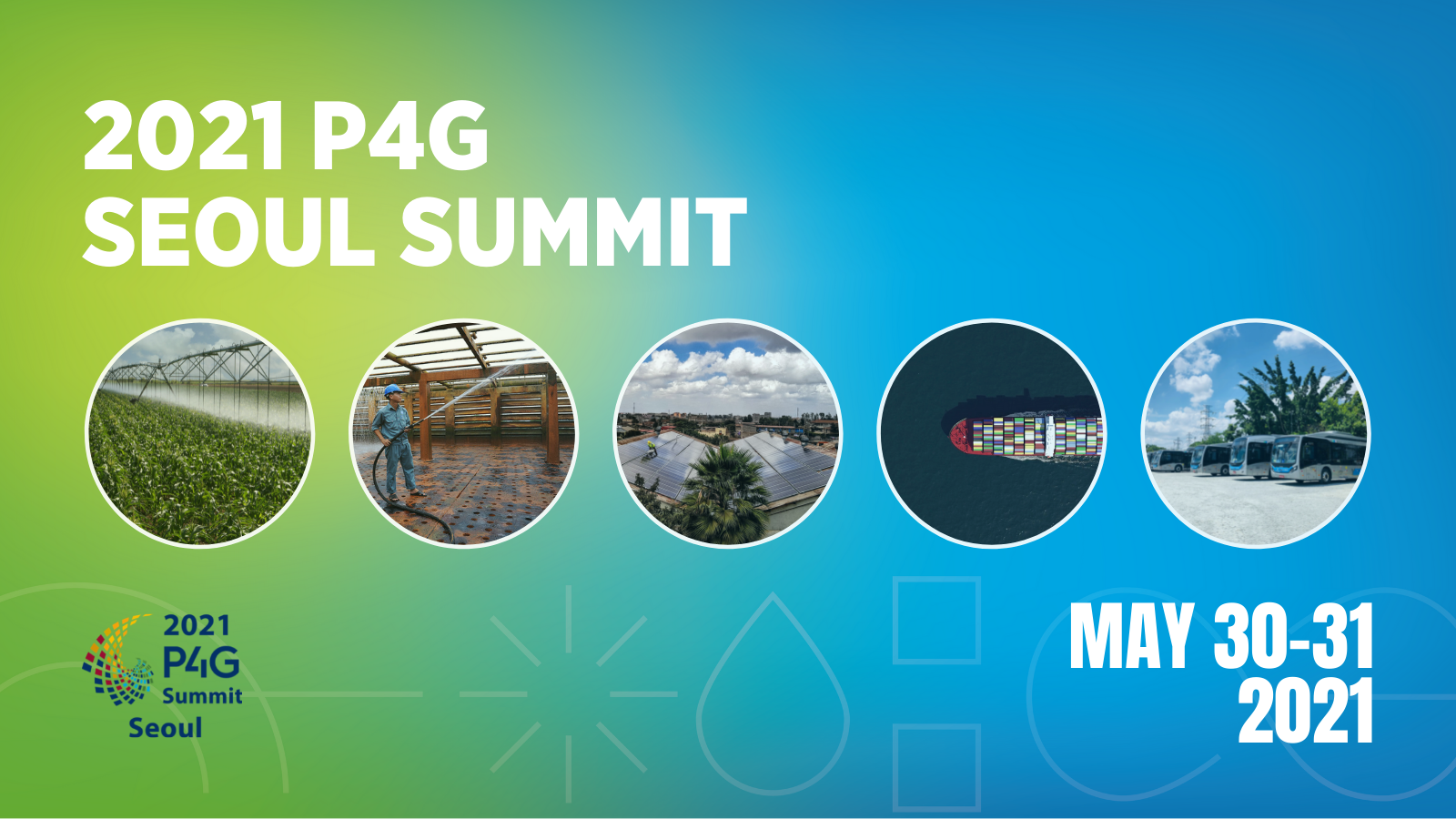
About
Prior to the 2021 P4G Seoul Summit program on May 30-31, leading organizations and P4G partnerships will host a series of official side events. These discussions will include the perspectives of high-level leaders and be focused on scaling market-based solutions to deliver impact.
The Korean New Deal and Smart Buildings: Fighting Climate Change while Creating Jobs and Growth
This event will showcase how the green restart, and the Korean New Deal in particular, can help economies recover while accelerating our journey towards net zero emissions. It will look at how governments and the private sector are working to build smarter, more energy-efficient commercial buildings – and enable greater growth and climate action. Register here to join the session on May 25 from 15:30-17:00 KST / 2:30-4:00 EST.
Steering the Green Transition in Farming and Food – Innovative Technology as a Key Driver
Food Nations first Global Food Talk on innovative technology will prompt attendees to gain knowledge on game-changing technological solutions, scalable actions and partnership models for sustainable development. They will be inspired by international stakeholders focusing on the possibilities of innovative technology as a driver to accelerate the transformation of food systems and become motivated to take action towards green transition and share ideas to act towards the UN Food System Summit 2021. Register here to join the session on May 25 from 21:00-22:00 / 8:00-9:00 EST.
Green Insights: Toward Carbon Neutrality in Korea and Denmark
At this event, South Korea and Denmark will share knowledge, solutions and challenges towards carbon neutrality. High-level speakers from both countries will present climate plans and ambitions based on partnerships towards a greener future. The purpose of the event is to highlight the ambitions towards carbon reductions and carbon neutrality of both Denmark and Korea, as well as build a partnership between the Korean and Danish side through a signing of a Memorandum of Understanding between Korea Energy Information Culture Agency (KEIA) and State of Green. Register here to join the session on May 26 from 15:00-16:40 KST / 2:00-3:40 EST.
Investing in a Just Transition: How Benchmarks can Reorient Capital for People and Planet
This event will explore how a just transition can help to ensure a green and inclusive recovery and more sustainable future aligned with the UN Sustainable Development Goals and the Paris Agreement. The session will focus specifically on how investors can engage more meaningfully with companies and allocate capital to more effectively meet these goals. Speakers will also discuss how the World Benchmarking Alliance's Just Transition methodology and company assessments can support investors in holding companies accountable for their efforts to decarbonize, while protecting the rights and wellbeing of their workers and the communities in which they operate. Register here to join the session on May 27 from 17:00-18:30 KST / 4:00-5:30 EST.
Biogas To Green Hydrogen
How do we create viable state, municipal and private sector partnerships in moving from biogas to green hydrogen? Join leading Korean and Danish players and discuss ways of finding decentralized solutions to global problems. Register here to join the event on May 27 from 16:30-18:30 KST / 3:30-5:30 EST.
A High-Level Dialogue between P4G Sustainable Food Partnership CEOs; Unfolding an Innovative Partnership Model and SDG2 Impact Solutions
This high-level conversation between CEOs and high-level speakers will bring together key representatives from the P4G Partnership Sustainable Food Partnership and the P4G network to critically unfold the complexity and uniqueness of engaging in these types of partnerships. The discussion will include what challenges the food sector encounters in Ethiopia and beyond, and which solutions should be put in place to address these challenges. Register here to join the session on May 28 from 20:00-21:30 KST / 7:00-8:30 EST.
Offshore Wind, 12GW and Beyond
This side event on offshore wind will present key features and experiences generated from Korea and Denmark concerning regulatory frameworks, initiatives to de-risk investments, spatial marine planning, market conditions and technological solutions. The side-event will also present a new study on the cost of energy in Korea generated by the Korean-Danish partnership on energy in collaboration with the Dutch embassy in Korea. Join to learn insights from Korean, Danish and Dutch stakeholders sharing know-how, experiences and the future potential of offshore wind energy. Register here to join the event on May 28 from 15:00-17:30 KST / 2:00-4:30 EST.
International Cooperation to Facilitate the Adoption of E-Mobility for the Sustainable Development in GGGI Members
The event aims to bring together diverse stakeholders to share the experiences and lessons learned from the examples of ongoing/completed electric mobility activities. Government officials, business leaders, experts, practitioners and investors will debate the progress, challenges ahead and innovative collaboration, their visible impacts to date as well as policy and investment needs and challenges. Participants will engage through chat room discussions to share their comments and views on some key innovations and to encourage networking and collaboration. Register here to join the session on May 28 from 21:00 –22:30 KST / 8:00-9:30 EST.
Global Investor Action and Initiatives Towards Net-Zero
The Asia Investor Group on Climate Change (AIGCC) is hosting a global C-level investor panel, “Global Investor Action and Initiatives Towards Net-Zero” on behalf of The Investor Agenda at the P4G Global Summit in Seoul. It aims to help catalyze Asian investors, particularly those in South Korea adopt climate change strategies into their portfolios and participate in relevant global investor initiatives that have been actively progressing in other markets. Register here to join the session on May 31 from 15:00-18:00 KST / 2:00 – 5:00 EST.
P4G Entrepreneurs and SMEs Challenge
Throughout this event, the Ministry of SMEs and Startups of the Republic of Korea (MSS) and ASEM SMEs Eco-Innovation Center (ASEIC) will provide networking opportunities among innovative start-ups, SMEs, and investors to develop business and publicize their businesses. Moreover, the P4G Entrepreneurs and SMEs Challenge will provide an effective networking platform for both companies and the investor through the online exhibition and IR pitching session. The P4G Entrepreneurs and SMEs Challenge will also endeavor to make the environment more sustainable through the development of eco-friendly technologies and business activities by companies. Register here to join the session on May 31 from 18:00-20:00 KST / 5:00 – 7:00 EST.
For a full list of official Summit sessions occurring from May 24-31, visit the 2021 P4G Seoul Summit website.
Pre-event to 2021 P4G Seoul Summit Reinforces U.S. Role in Scaling Market-based Solutions in Developing Countries through P4G
.png)
Subject
Events
Publication Date
2021-05-18
About
“We know what has to be done and we have a clear path on how we deliver that for a better world,” remarked Jonathan Pershing, Senior Advisor to the Special Presidential Envoy for Climate, U.S., to kick off the webinar “Delivering Climate Ambition in Developing Countries Through P4G” on May 14, 2021.
A pre-event to the 2021 P4G Seoul Summit, the discussion was jointly hosted by Embassy of the Republic of Korea, the Embassy of Denmark, and the World Resources Institute. The webinar focused on how the U.S. can finance, incubate and scale innovative market-based solutions in developing countries. The event highlighted P4G’s high-impact partnerships and the P4G Summit’s role in being a stepping stone to COP26. The Summit builds off the momentum created by events intended to catalyze climate action including the Climate Adaptation Summit in January and the U.S. Leaders Summit on Climate in April.
H.E. Lee Soo-Hyuck, Ambassador of the Republic of Korea to the U.S. and H.E. Lone Dencker Wisborg, Ambassador of Denmark to the U.S opened the session by explaining how the P4G Summit will contribute to global efforts to build back better and greener from the COVID-19 crisis. The Ambassadors both recognized the integral role that innovative public-private partnerships will play in providing the financial models needed to fight climate change.
Jonathan Pershing offered keynote remarks outlining the U.S.’s plans to enhance global cooperation for a zero-emissions world by 2050. Pershing focused on the need to increase investment in climate solutions, wherein public finance is not enough. Holistic solutions must also leverage private capital to mobilize the trillions of dollars needed to shift to a green and clean world future. Pershing also framed the P4G Summit as part of a milestone year building momentum through these global events that continue to raise the bar.
Ambassador Yeonchul Yoo, Ambassador for Climate Change, Republic of Korea shared Korea’s plans for the Summit centered around the theme of an inclusive green recovery for climate neutrality. As the first multilateral environmental summit hosted by Korea, the event will urge key leaders to build on commitments and cooperation on climate action. “We value P4G because unlike other international bodies, P4G is an inclusive multilateral platform that brings governments, business and civil society together to prompt all stakeholders to deliver results,” Yoo said.
John Murton, UK COP26 Special Enjoy, outlined the UK’s four main goals for COP 26, including mobilizing public and private finance and accelerating partnerships, like those led by P4G. Murton noted that, “P4G presents a significant opportunity to advance all of these agendas, as we hope countries will join us and make clear commitments to speed the transition.”
Ian de Cruz, Global Director, P4G, presented P4G’s approach and pipeline of partnerships relevant to the U.S. climate priorities, noting that “The U.S. joining P4G’s ecosystem would be terrific in sharing its expertise in developing countries to deliver solutions that are self-sustaining and market-based.” Leaders of P4G’s high impact partnerships, including Ana Hajduka, CEO, Africa GreenCo, and Marcel Regis, President, Bavaria Brewery shared their transformative models and the key role P4G has played in accelerating their work.
Manish Bapna, President and CEO (Interim), WRI moderated the event including a panel discussion about what the U.S. can do to step up climate finance. Panelists included Karin Finkelston, Vice President of Partnerships, Communications, and Outreach, International Finance Corporation (IFC) and P4G Board member; Durreen Shahnaz, Founder & CEO, Impact Investment Exchange, a lead partner in P4G’s Women’s Livelihood Bond Partnership; and Bryan Wisk, Chief Investment Officer, Asymmetric Return Capital (ARC) Investments and partner in P4G’s ZEBRA partnership.
Finkelston shared the U.S.’s key role in working with IFC to facilitate policy reforms that create a pipeline of bankable projects, noting that “P4G is actually bridging that role by showing how to incubate and pilot private sector solutions.” Wisk highlighted the challenge and opportunity in finding creative ways to finance climate action that P4G addresses by accelerating investable models. Shahnaz urged climate investment to consider the intersection with gender equality to ensure the creation of solutions that deliver inclusive social and environmental returns in addition to financial ones. The panelists emphasized the need to build inclusivity into these projects from the beginning, which P4G plays a key role in delivering on.
Tomas Anker Christensen, Danish Climate Ambassador, closed the event by reinforcing previous speakers’ comments on P4G’s importance in bringing together multistakeholder coalitions to build momentum. As he remarked on the pivotal role of the P4G Summit in the global arena, Christensen said “We hope the P4G Summit will be a place to enhance ambitious climate actions and pick up a roadmap for delivering on further commitments.”
Watch the webinar here.
Newsletter: May 2021
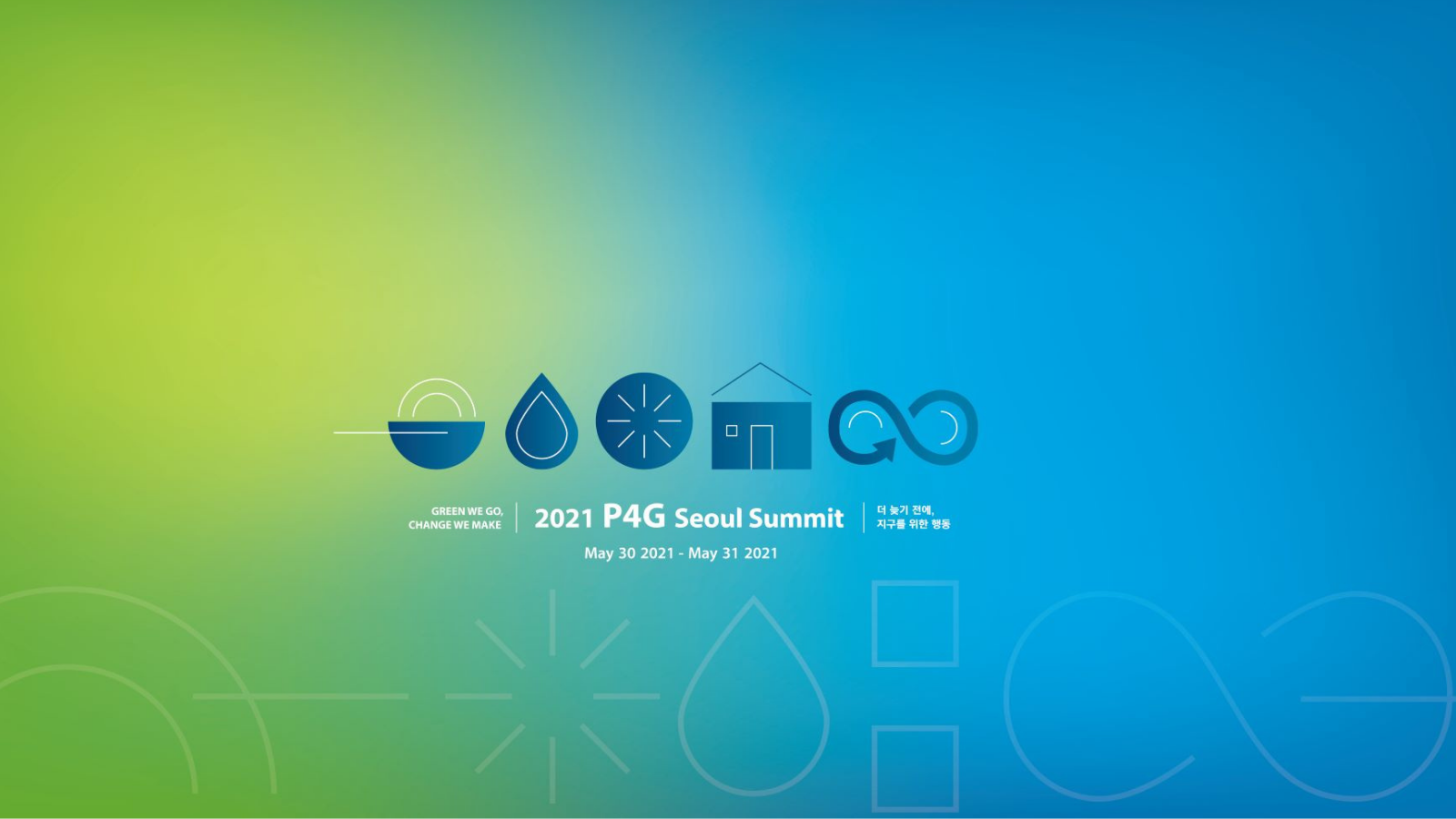
Workshop on Scaling Sustainable Industrial Clusters Emphasizes P4G’s Value in Delivering on Kenya’s Green Ambitions
.png)
Subject
Events
Country
Publication Date
2021-04-29
Partnership
About
In collaboration with the Kenya Private Sector Alliance (KEPSA), P4G hosted a virtual workshop titled Achieving Kenya's Green Ambitions: Scaling Sustainable Industrial Clusters on April 28, 2021. Featuring P4G partnership SSEZ/Sustainable Industrial Clusters, the workshop addressed learnings around Sustainable Industrial Clusters (SICs) in Kenya and how to replicate and scale successful models across Kenya, Africa, and the globe.
Dr. Julia Muia, Principal Secretary of the National Treasury and P4G National Platform Co-Chair, kicked off the session by noting the value of P4G’s acceleration in Kenya. He remarked, “As a government ministry, we are very proud of this partnership with P4G because when we look at Kenya’s goals and P4G’s delivery methodology, they are very well aligned to our commitment to sustainable growth.” Dr. Muia outlined the ways in which P4G’s work on Sustainable Industrial Clusters offers an opportunity for Kenya to transform into a green manufacturing hub at speed and scale in line with Kenya Vision 2030.
Nik Nesbitt, Chairman of KEPSA and P4G National Platform Private Sector Co-Chair reiterated the role of SICs in delivering on Kenya’s sustainable development, noting that going green will shine a positive light on Kenya, thus attracting more investment. He remarked, “working through P4G, we have the opportunity to drive change and innovation through this partnership and others.”
The first session, moderated by Ambassador Dennis Awori, Chairman of Toyota Kenya and P4G Board Member, focused on the high-level vision for a corridor of SICs across Kenya and the actionable opportunity for investors and businesses in Oserian Two Lakes Industrial Park. Gail Klintworth, Chair of Savo Project Developers and Robert Ward, Managing Director of Oserian Two Lakes introduced the concept of sustainable industrial clusters as a one-stop sustainable supply solution throughout Kenya and potentially across East Africa.
Klintworth also shared how Savo has taken learnings from its first zone, LADOL in Nigeria, and the current Oserian zone in Kenya to produce a knowledge product, titled “How to Get Stuff Done.” The product includes information on the roles governments, investors, and businesses play in developing and expanding Sustainable Industrial Clusters.
P4G’s Director of Investments, Sarbinder Singh, moderated the panel discussion that included speakers such as Rana Ghoneim, Chief of Energy Systems and Infrastructure Division at the United Nations Industrial Development Organization and Mahamadou Tounkara, Director of Governance, Strategy, Partnerships and Communications at the Global Green Growth Institute. The discussion focused on how to scale Sustainable Industrial Clusters in Kenya and Africa. Ghoneim emphasized the need to de-risk these clusters by working with governments to improve policy frameworks to attract investment and create a conducive environment for investors. Tounkara echoed these comments, adding that innovation must be at the heart of this change.
The workshop solidified the importance of creating pipelines of bankable Sustainable Industrial Clusters, wherein P4G fills an essential gap. Speakers recognized that P4G serves as an invaluable platform through its strong relationship with the Kenya National Platform and ability to connect with investors from development finance institutions and the private sector. As the partnership moves forward, the “How to Get Stuff Done” knowledge product and acceleration from P4G’s dynamic global ecosystem can galvanize a global effort to establish corridors of sustainable industrial clusters.
UK Pre-Summit Event Positions 2021 P4G Seoul Summit as Stepping Stone to COP26
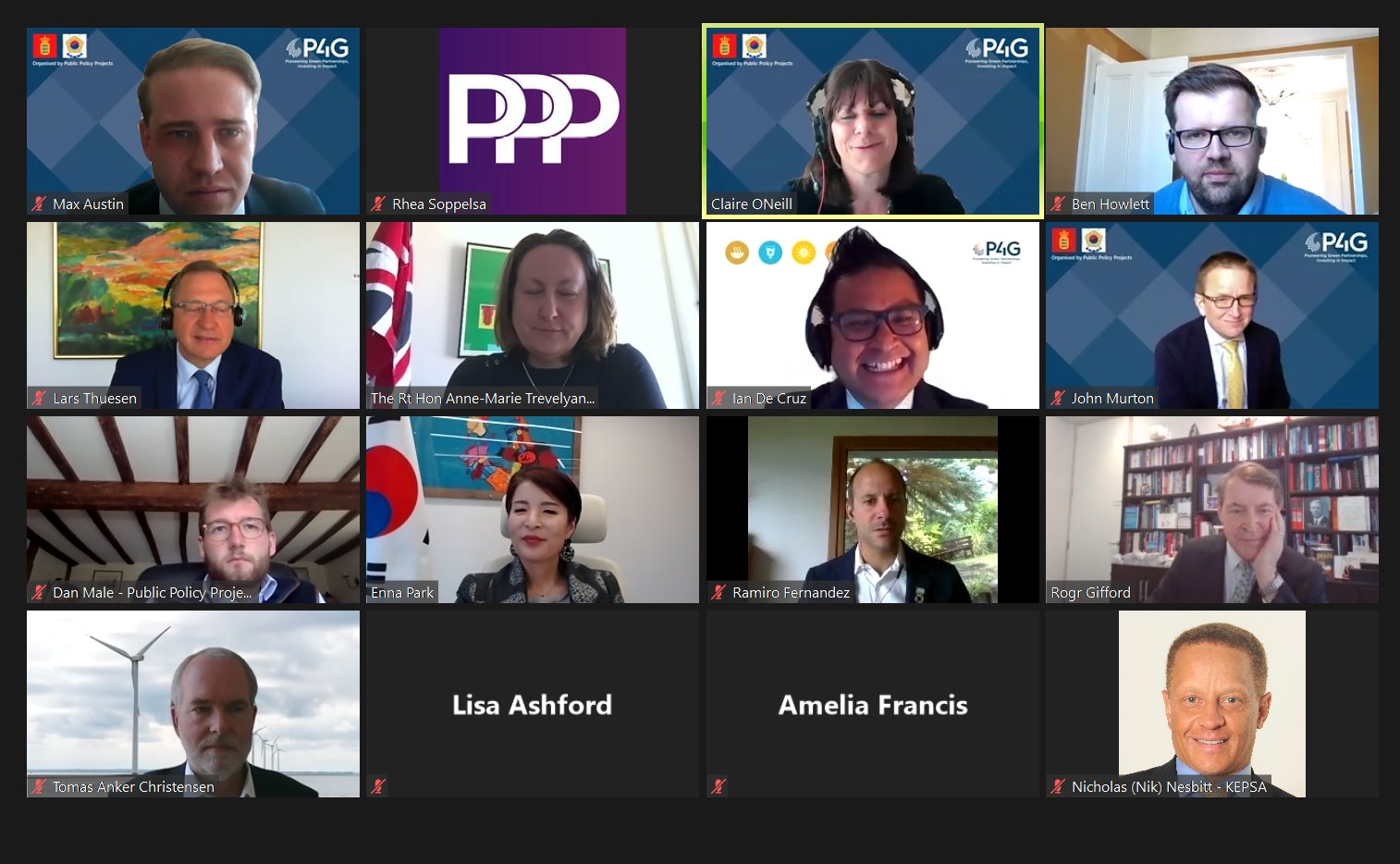
Subject
Events
Country
Publication Date
2021-04-29
About
Global collaboration and bold, innovative solutions are the way forward to achieve a net zero future. At a recent pre-event in the United Kingdom for the 2021 P4G Seoul Summit, ambassadors and COP26 (UN Climate Change Conference of the Parties) climate leaders acknowledged the value of P4G’s approach to delivering impact and the timeliness of the P4G Summit in raising countries’ climate ambitions ahead of COP26 in Glasgow. The April 19 event was co-hosted by the Embassy of the Republic of South Korea and the Embassy of Denmark in the United Kingdom. John Murton, UK COP26 Special Envoy, moderated the event.
In her opening remarks, Enna Park, Ambassador of the Republic of Korea to the UK urged more countries to pledge net zero commitments like Korea’s announcement of achieving net zero by 2050. She highlighted the P4G Summit’s role as a global moment to scale practical and innovative solutions for a green transition. Her Danish counterpart Lars Thuesen, Ambassador of Denmark to the UK, shared that the first P4G Summit in Copenhagen marked the journey to a sustainable future, and the upcoming one will have a similar focus on action and concrete solutions.
Rt Hon Anne-Marie Trevelyan, MP, UK International Champion on Adaptation and Resilience for COP26 detailed the UK’s approach to green growth with its aims to quadruple offshore wind and phase out new petrol and diesel to electric vehicles by 2030. She positioned the 2021 P4G Seoul Summit as an important steppingstone on the road to COP26 and called out four global progress areas including reducing emissions; strengthening adaptation; mobilizing private and public finance; and enhancing international collaboration.
Yeon-chul Yoo, Ambassador for Climate Change, Republic of Korea, reiterated previous speakers remarks on the need for multilateral efforts and called out P4G as the line between “existing government action and the new action required.” He positioned the Summit as an opportunity to build on future ideas and for countries to set ambitious goals. Tomas Anker Christensen, Climate Ambassador, Denmark spoke about how the P4G Summit could lay the foundation for Asia to lead a green transition and P4G’s role in incubating the solutions that can deliver this change.
Ian de Cruz, Global Director, P4G emphasized the value of P4G’s investing in impact approach and shared examples of tangible solutions P4G is scaling in developing countries to meet global climate action and sustainable development targets. Sir Roger Gifford, Chair of the Green Finance Institute remarked that this approach is exactly the solution needed.
Gail Klintworth, Chair of Savo Project Developers highlighted P4G’s value in accelerating the P4G partnership SSEZ/Sustainable Industrial Clusters, which is trying to green industrial zones and drive US $1 billion in resilient infrastructure into these clusters. She emphasized the potential impact, with one zone able to create 10,000 local jobs and urged participants to broaden their approach from large top-down government projects to global funds focused on just transitions. Lisa Ashford, CEO, Ethex, explained the approach behind P4G partnership Energise Africa and bringing people powered finance through crowdfunding to accelerate energy access. She mentioned the outsize impact Energise Africa had already achieved by supporting more than 7,000 micro, small and medium enterprises and the invaluable acceleration of P4G to grow the partnership in Kenya.
Bringing in the private sector and P4G National Platform perspective was Nicholas Nesbitt, Chairman, Kenya Private Sector Alliance (KEPSA) and P4G Kenya National Platform Co-Chair. He shared how P4G advances Kenya’s green growth agenda by accelerating partnerships on the ground that align with Kenya’s social and economic agenda. He spoke about how KEPSA’s mobilization of the private sector through partnerships like Energise Africa and SSEZ/SIC provides engines of growth for the country. Several additional P4G partnerships participated at the meeting including the Halving Food Loss and Waste by Leveraging Economic Systems (FLAWLESS), Africa GreenCo, and GeoFutures GreenInvest.
P4G’s contributions to the Race to Zero through its e-mobility solutions were highlighted by Ramiro Fernandez, Senior Advisor to the COP Chile Climate Champion. He welcomed the P4G Summit as a stepping stone to COP26 and the need for innovative partnerships to drive change. He also stressed how P4G had supported the set-up of a green hydrogen strategy for the Chilean Ministry of Energy and Mining.
In his closing remarks, John Murton aptly said, there is a no trade-off between pursuing projects that tackle climate change and help achieve the Sustainable Development Goals. He spoke about the exciting opportunity for countries to raise their ambitions and urged all participants to collaborate toward a successful P4G Summit.
Independent Food Systems Dialogue Emphasizes Value of P4G’s Actions to Reduce Food Loss and Waste
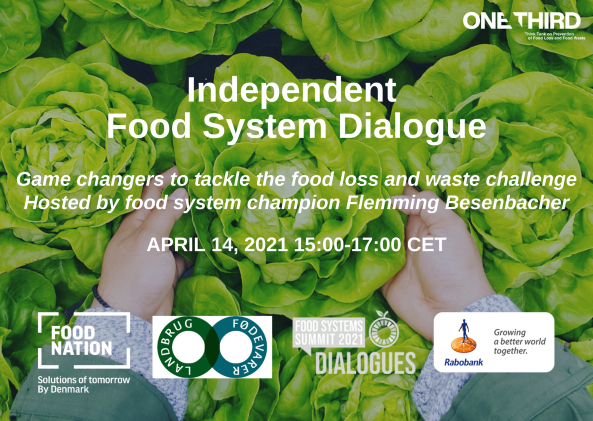
About
P4G Global Director Ian de Cruz highlighted P4G's work on reducing food loss and waste through innovative business models at the Independent Food Systems Dialogue, a side-event to the World Food Summit – Better Food for More People. Hosted by the Danish think tank, One/Third, the event focused on identifying key actions and next steps to spark food systems transformation which were submitted to the UN Food Systems Summit.
UN Food Systems Champion Flemming Besenbacher underscored the urgency of moving from talking to taking concrete action to meet the sustainable development goals. He remarked, “the fight against food loss and waste is an ethical and humanitarian issue, as well as a climate change problem.”
Keynote speaker, Wiebe Draijer, Chairman of the Managing Board of Rabobank, highlighted the multi-dimensional effects of reducing food loss and waste, whereby effective actions also tackle greenhouse gas emissions, enable better nutrition to more people, and provide good incomes for those who need it. With Rabobank leading in the network of 12.3 champions, Draijer urged other financial institutions to join the effort. He said, “The financial sector must be an important lever to address this issue.”
In the breakout session on finance, De Cruz emphasized the need for game-changing solutions, such as financial products and voluntary agreements being accelerated by P4G’s FLAWLESS partnership in Mexico, South Africa and Indonesia. De Cruz facilitated a robust discussion about making food loss and waste an attractive investment to transform food systems. Leading change makers in the session identified the need to scale efforts to measure food loss and waste, whereby data and monitoring can serve as a mechanism for de-risking investment. Participants also encouraged countries, corporates and civil society to commit to voluntary targets to reduce food loss and waste. The attendees expressed consensus about the importance of financial institutions and investors developing investment facilities, financial instruments and products to monetize food loss and waste.
To complement these actions, participants identified key next steps, which included establishing regional working groups to measure food loss and waste in high-impact countries, including Indonesia and South Africa. The working groups can also provide examples that prove the business case and through on-the-ground solutions focusing on consumer household waste and cold chains in the African region. Monetizing food loss and waste will also require institutions to develop innovative financial and investment models, such as loans and financing facilities with key stakeholders to meet food loss and waste targets.
The dialogue concluded with facilitators sharing the key outcomes from each of the six breakout sessions, ranging from calls to prioritize more public-private partnerships, increase awareness to empower consumer change, and actively involve youth, among others. The conversation on investment in food loss and waste will be continued at the P4G Seoul Summit in May, the UN Food Systems Summit in September, and COP26 in November, as this year marks a key turning point in the global push for more sustainable, resilient food systems.
Find the recommendations submitted to the UN Food Systems here and view the event summary video here.
